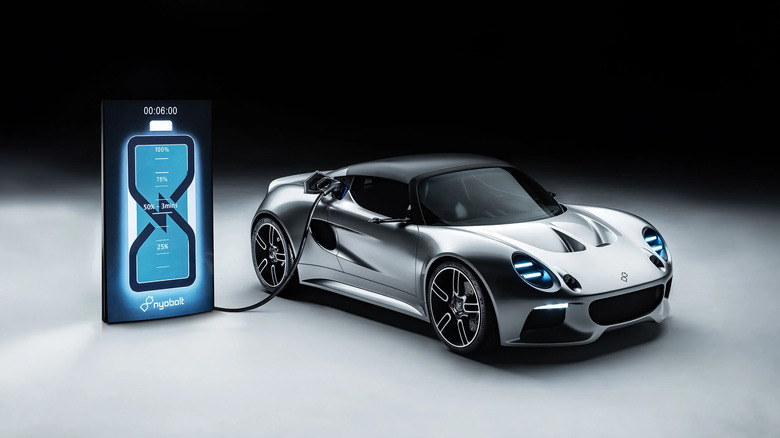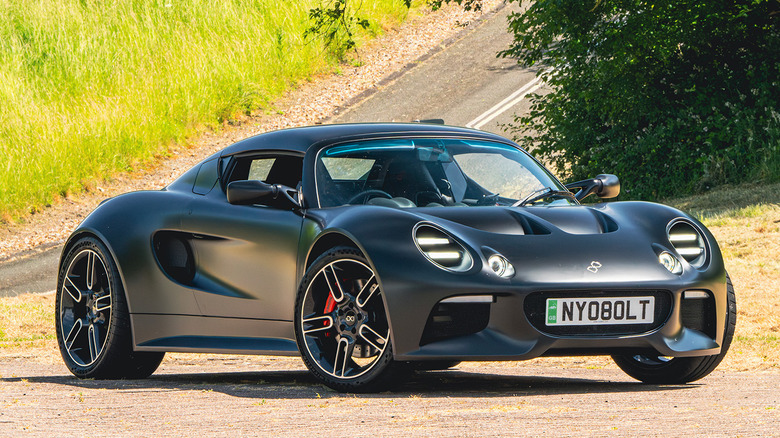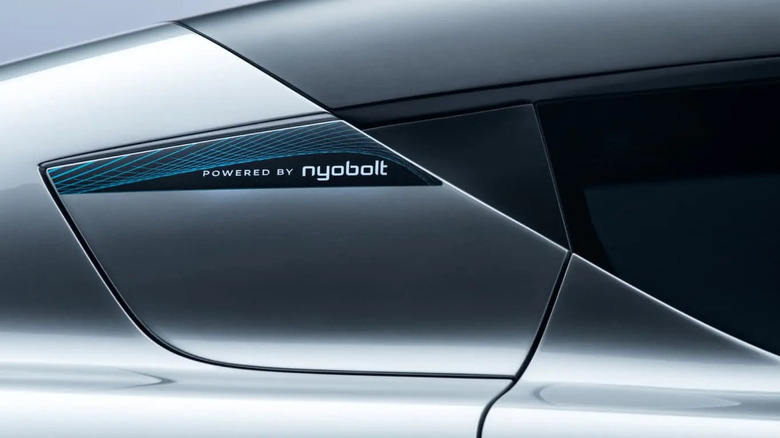This Electric Sportscar One-Ups Other EVs When It Comes To Charging Time
When you take a typical combustion engine car to the gas station to fuel up, the entire refueling process generally takes around five to ten minutes. You put your card in, you pick your grade, you pump your gas, you leave. By contrast, recharging the battery on an EV is a slightly more lengthy process. Assuming that your local gas station has a Direct Current Fast Charging station, then charging your EV's battery can take anywhere from 20 minutes up to an entire hour, and that's in the best-case scenario. Even if plugging your car in has fewer steps than refueling, if you're trying to get around town in a timely fashion and only need a quick top-off on your power reserves, such a slow pace is difficult to work around. That's part of what makes the notion of having a charger at home for passively juicing up seem appealing, though that comes with its own headaches.
Thankfully, much like the rest of the EV development process at large, innovators aren't content with the bare minimum. One such innovative startup, the UK-based Nyobolt, is currently developing a new kind of EV battery and charging system that, in its ideal form, could cut that tumultuous charging time down to roughly the same as it would take to pump some gas, if not even less. The team's first proof of concept has arrived in the form of a prototype EV sports car.
The Nyobolt prototype can jump from 10-80% in under five minutes
This past June, only 12 months after Nyobolt originally revealed its concept for a supercharged EV sports car, the team revealed its working prototype, developed in tandem with Callum Designs. This sporty little number is equipped with Nyobolt's proprietary charging technology, which was put to the test with the assistance of a 350kW DC charger. For reference, that's around the maximum voltage of a typical DC Fast Charger.
After plugging into the charger at 10% battery capacity, Nyobolt's custom-made 50Ah 35kWh battery pack surged to life, juicing up to 80% capacity in just four minutes and 37 seconds. Based on Nyobolt's estimates, with this quick recharge, the prototype car would be able to travel around 120 miles before needing another top-off.
In addition to being remarkably fast at recharging, Nyobolt's batteries have proven to be surprisingly resilient. Over the course of multiple tests, its 24.5Ah power cells have successfully withstood over 4,000 full DoD (Depth of Discharge) fast charge cycles, the driving distance equivalent of 600,000 miles. In spite of this heavy usage, the batteries have seen only negligible levels of degradation, still receiving power at the same speed and easily reaching over 80% charge capacity.
Nyobolt is researching how to bring this charging speed to existing EVs
Of course, the entire purpose of Nyobolt's research is to bring high-speed EV charging to the industry at large, not to keep it to itself. This technology wouldn't be much help to the greater development and proliferation of EVs if only one kind of car had it, after all.
Nyobolt has been working with multiple major equipment manufacturers, testing the efficacy of its batteries and charging systems in a variety of settings. According to Nyobolt's press release, one manufacturer ran an independent test using Nyobolt's framework and its own EVs, discovering that the faster-charging, longer-lasting batteries were able to successfully run through charge and discharge cycles with an efficacy similar to Nyobolt's prototype vehicle.
Currently, Nyobolt is in active talks with at least eight different manufacturers on the potential of incorporating its fast-charging systems into high-performance EVs. Not only that, but the company is also researching implementation of the system into adjacent fields like heavy machinery and even robotics. If the efficacy of these batteries can be verified in multiple scenarios, it would be another colossal step toward the greater adoption of EVs.


